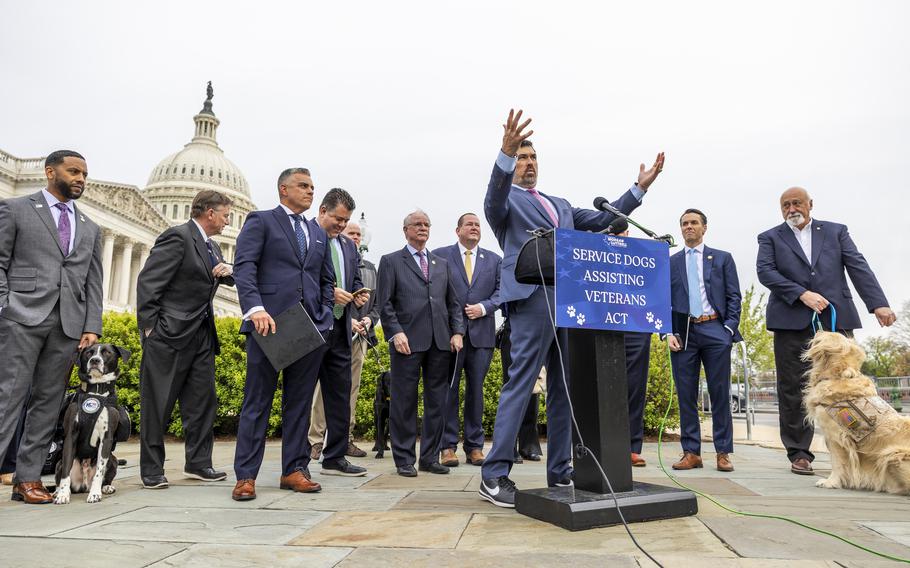
Rep. Morgan Luttrell, R-Texas, holds a news conference on Capitol Hill in Washington on April 2, 2024, to formally announce the SAVES Act. (Eric Kayne/Stars and Stripes)
Four years ago Tuesday, America witnessed one of the most tragic days in recent military history. On Aug. 26, 2021, as our service members worked tirelessly at Abbey Gate in Kabul, Afghanistan, during the Biden Administration’s botched withdrawal, a suicide bomber’s attack claimed the lives of 13 Americans.
The names of those lost at Abbey Gate deserve to be honored and remembered. They include: 11 Marines — Sgt. Johanny Rosario Pichardo, of Massachusetts; Sgt. Nicole L. Gee, of California; Staff Sgt. Darin T. Hoover, of Utah; Cpl. Hunter Lopez, of California; Cpl. Daegan W. Page, of Nebraska; Cpl. Humberto A. Sanchez, of Indiana; Lance Cpl. David L. Espinoza, of Texas; Lance Cpl. Jared M. Schmitz, of Missouri; Lance Cpl. Rylee J. McCollum, of Wyoming; Lance Cpl. Dylan R. Merola, of California; and Lance Cpl. Kareem M. Nikoui, of California; one sailor, Navy Corpsman Maxton W. Soviak, of Ohio; and one soldier, Army Staff Sgt. Ryan C. Knauss, of Tennessee.
These service members died protecting others, even at the cost of their own lives. As someone who deployed to Afghanistan under Operation Enduring Freedom, I understand the commitment and courage of their service. Their sacrifice represents the dedication of all who served during the wars in Afghanistan and Iraq.
While we appropriately focus on honoring these heroes, we cannot ignore the crisis facing those who returned home. An estimated 20% of Iraq and Afghanistan war veterans struggle with post-traumatic stress disorder (PTSD), and more than 450,000 of our warfighters have been diagnosed with at least one traumatic brain injury (TBI) since 2000.
Tragically, nearly 17 veterans die by suicide each day.
The Department of Veterans Affairs (VA) has made great strides under the Trump Administration, reducing its claims backlog by over 37% this fiscal year while processing more than 2.5 million claims.
But it can’t stop there.
There are more opportunities for our federal government to take action for our veterans.
For instance, current VA policy limits service dogs primarily to veterans with mobility issues or certain PTSD cases. My legislation, the Service Dogs Assisting Veterans (SAVES) Act, would expand this successful program to include veterans suffering from traumatic brain injuries, paralysis, military sexual trauma and other service-connected conditions. These service dogs would provide veterans with a new pathway toward independence while breaking the vicious cycle of isolation that too many encounter once home.
The SAVES Act represents one important step toward addressing the real needs of our veterans who served in Afghanistan, Iraq and other conflicts. As a member of the House Veterans Affairs Committee and as a veteran myself, I’m committed to improving the quality of life for our veterans. This cannot be a partisan issue, and I’m thankful to have 27 Republicans and 19 Democrats join me in this effort.
Four years later, America still remembers Aug. 26, 2021, and the tragedy that unfolded at Abbey Gate. Now we must prove that our words have meaning by taking concrete action to those who served alongside these fallen heroes, ensuring they have the support they need for the rest of their lives.
The best way to honor those who were killed in these attacks is by fighting for those who returned home. That fight continues today in the halls of Congress.
Congressman Morgan Luttrell represents Texas’ 8th District in the U.S. House of Representatives and serves on the House Committees on Veterans Affairs and Armed Services.